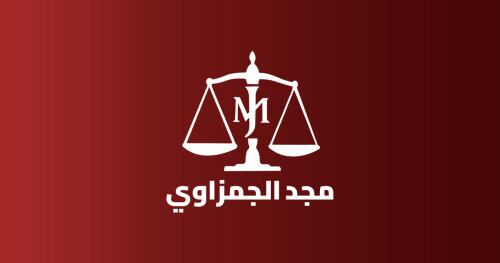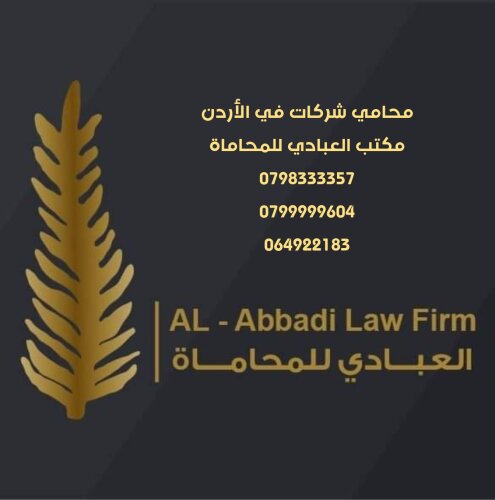Best Faith-Based Law Lawyers in Hashemite Kingdom of Jordan
Share your needs with us, get contacted by law firms.
Free. Takes 2 min.
Or refine your search by selecting a city:
List of the best lawyers in Hashemite Kingdom of Jordan

About Faith-Based Law in the Hashemite Kingdom of Jordan
Faith-Based Law in the Hashemite Kingdom of Jordan primarily refers to the application of Islamic Sharia principles in various aspects of civil law. As a predominantly Muslim country, Jordan integrates Islamic jurisprudence, particularly in matters related to personal status laws, which encompass marriage, divorce, inheritance, and family matters. This unique legal framework allows for the coexistence of civil and religious legal principles, tailored to respect religious beliefs while upholding national laws and regulations.
Why You May Need a Lawyer
There are several situations where individuals might require legal assistance regarding Faith-Based Law in Jordan. Common scenarios include:
- Seeking guidance on marriage contracts and their legal implications under Sharia law.
- Navigating complex inheritance issues, particularly in cases involving multiple heirs and contested estates.
- Addressing family disputes that involve custody arrangements and divorce proceedings.
- Understanding and complying with religious obligations within legal frameworks, such as zakat (charitable giving).
- Handling legal matters in business or financial transactions that require adherence to Islamic ethical standards.
Local Laws Overview
In Jordan, Faith-Based Law is significantly influenced by Islamic Sharia, especially in the area of personal status law. Key aspects include:
- Family Law: Governed by Islamic Law, addressing rights and responsibilities in marriage, divorce, child custody, and guardianship.
- Inheritance Law: Sharia-compliant rules dictate the redistribution of an individual's estate, ensuring rightful heirs receive their due shares.
- Contract Law: Must align with Islamic principles, prohibiting usury (riba) and ensuring ethical conduct in commercial dealings.
- Court System: Religious courts handle cases related to family and personal status issues, operating alongside civil courts.
Frequently Asked Questions
What is Faith-Based Law?
Faith-Based Law in Jordan integrates Islamic principles with civil law to regulate personal status matters, particularly for Muslims.
Does Faith-Based Law apply to non-Muslims in Jordan?
Non-Muslims in Jordan are subject to their own religious courts for personal status issues. However, Muslim faith-based laws are applied if involved in cases with Muslims.
How are inheritance matters resolved under Faith-Based Law?
Inheritance is distributed according to Islamic Sharia where specific shares are allocated to eligible family members such as children, spouses, and parents.
How is marriage regulated under Faith-Based Law?
Muslim marriages must comply with Sharia principles, including the necessity of a marriage contract and consent from both parties.
What legal assistance can a lawyer provide in family law matters?
A lawyer can help with drafting legal documents, representing in court, and providing advice to ensure compliance with both Sharia and civil law.
Are there any prohibitions in commercial contracts under Faith-Based Law?
Yes, contracts must avoid elements like interest (riba), uncertainty (gharar), and unethical practices to comply with Islamic principles.
What is the role of religious courts in Jordan?
Religious courts primarily handle personal status cases involving Muslims, such as marriages, divorces, child custody, and inheritance disputes.
Can women seek legal rights under Faith-Based Law?
Yes, women have legal rights under Faith-Based Law and may seek legal assistance to ensure those rights are protected, especially in family law matters.
How are child custody issues resolved?
Custody decisions prioritize the child's best interests while considering Islamic law guidelines, often granting primary custody to the mother for young children.
Is it necessary to have a lawyer in Faith-Based legal proceedings?
While not mandatory, having a lawyer can provide valuable guidance and advocacy in navigating complex legal issues involving Faith-Based Law.
Additional Resources
Several resources and organizations can assist those seeking legal advice concerning Faith-Based Law in Jordan:
- The Sharia Courts: Handle most family law matters including marriage, divorce, and inheritance.
- Jordanian Bar Association: Provides a directory of licensed lawyers, some of whom specialize in Faith-Based Law.
- Ministry of Justice: Offers resources and legal frameworks relevant to Faith-Based Law.
- Local NGOs: Some non-governmental organizations offer legal aid for individuals navigating family law and personal status issues.
Next Steps
If you require legal assistance in the field of Faith-Based Law in Jordan, consider taking the following steps:
- Identify and outline your legal issue to understand the specific type of legal advice you need.
- Search for and consult with a qualified lawyer who specializes in Faith-Based Law to discuss your case and potential legal remedies.
- Prepare necessary documentation in advance of your legal consultation to facilitate a thorough review of your situation.
- Consider seeking advice from multiple sources, including religious scholars, especially in complex matters requiring both legal and religious understanding.
Lawzana helps you find the best lawyers and law firms in Hashemite Kingdom of Jordan through a curated and pre-screened list of qualified legal professionals. Our platform offers rankings and detailed profiles of attorneys and law firms, allowing you to compare based on practice areas, including Faith-Based Law, experience, and client feedback.
Each profile includes a description of the firm's areas of practice, client reviews, team members and partners, year of establishment, spoken languages, office locations, contact information, social media presence, and any published articles or resources. Most firms on our platform speak English and are experienced in both local and international legal matters.
Get a quote from top-rated law firms in Hashemite Kingdom of Jordan — quickly, securely, and without unnecessary hassle.
Disclaimer:
The information provided on this page is for general informational purposes only and does not constitute legal advice. While we strive to ensure the accuracy and relevance of the content, legal information may change over time, and interpretations of the law can vary. You should always consult with a qualified legal professional for advice specific to your situation.
We disclaim all liability for actions taken or not taken based on the content of this page. If you believe any information is incorrect or outdated, please contact us, and we will review and update it where appropriate.
Browse faith-based law law firms by city in Hashemite Kingdom of Jordan
Refine your search by selecting a city.














